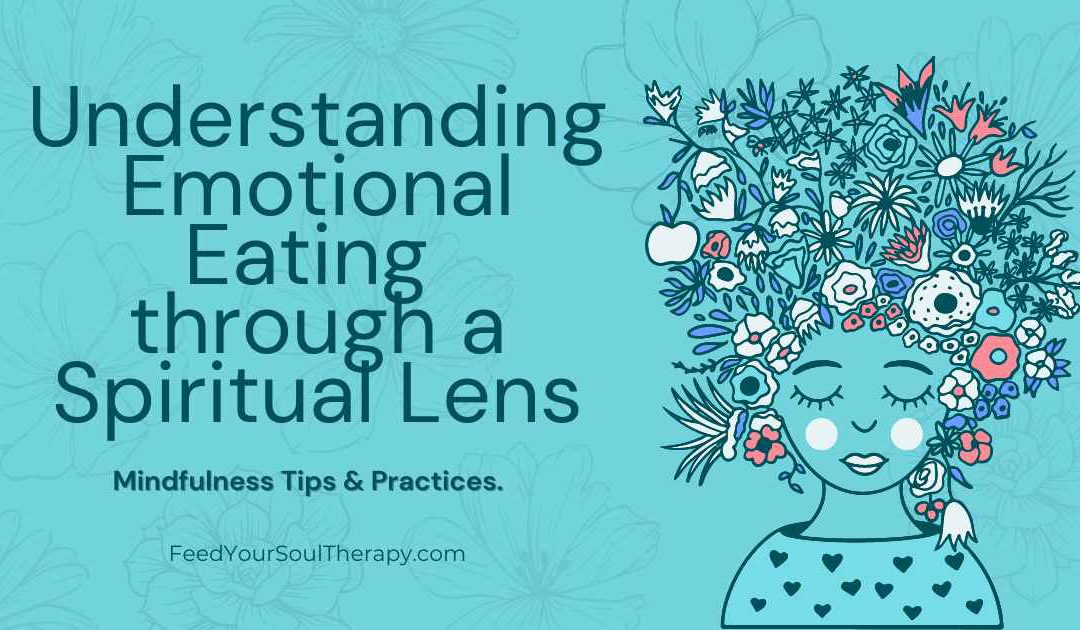We live in a fast-paced world and many of us turn to food and overeating as a source of comfort during times of stress, sadness, boredom and loneliness.
Emotional eating is a common experience and can have profound effects on both our physical and emotional well-being.
However, when we delve deeper, we find that emotional eating often intersects with our spiritual journey.
Emotional eating’s intersection with spirituality reveals important insights about our inner selves and our quest for fulfillment.
What is Emotional Eating?
Emotional eating occurs when we use food to cope with our emotions and our lives rather than to satisfy physical hunger.
This can manifest as eating in response to stress, anxiety, depression, or even boredom/loneliness.
Occasional indulgence is a normal part of life, chronic emotional eating can lead to physical discomfort and may signal a deeper need for emotional and spiritual nourishment.
The Spiritual Dimension of Emotional Eating
From a spiritual perspective, emotional eating can be seen as a form of misalignment between our outer behaviors and our inner needs.
No matter what, our soul seeks balance, fulfillment, and connection.
Truthfully, when our needs are unmet, we may unconsciously turn to food as a substitute for the emotional and spiritual comfort we truly crave.
First, focus on Awareness and Mindfulness.
The journey toward understanding and healing from emotional eating begins with awareness.
Mindfulness practices can help us become more attuned to our emotional triggers and the reasons behind our eating patterns.
We can look to a variety of mindfulness practices to help us:
- Journaling
- Meditation
- Walking outside
- Reading
Without judgment, we can be mindful and observe our thoughts and feelings.
As we increase in mindfulness we can start to recognize when we are eating for emotional reasons rather than physical hunger.
Second, connect with your Inner Self.
Spiritual practices offer a gateway to connect with our deeper selves. Engaging in activities such as prayer, meditation, or spiritual reading can provide insight into our emotional needs and help us develop healthier coping mechanisms.
When we nourish our soul through these practices, we create a sense of inner peace and contentment that reduces the need for external comfort, including food.
Third, find fulfillment Beyond the Food.
True nourishment for the soul comes from addressing our core needs for love, purpose, and connection.
Furthermore, you could consider exploring activities that bring you joy and fulfillment like:
- Creative expression
- Meaningful relationships
- Community involvement
By focusing on these sources of nourishment, we can reduce our reliance on food as a means of emotional comfort.
Lastly, embrace Compassion and Self-Kindness.
It is important to approach this path with compassion and self-kindness.
Emotional eating is not a moral failure, but a signal that we need to explore and address our emotional and spiritual needs.
In the end, be gentle with yourself as you navigate this path and recognize that healing is a gradual process.
Focus on practical tips for integrating spiritual practices into your daily life.
- Set aside time each day for reflection or meditation. Even a few minutes can help center your thoughts and emotions.
- Keep a journal to write out your thoughts and emotions. This can reveal insights into your triggers and help you be more mindful.
- Seek out spiritual or support communities. Connecting with others on a similar journey can provide encouragement and shared wisdom.
- Engage in activities that feed your soul. For example use walking on grass, forgiveness and gratefulness as a regular part of your spiritual practice.
Finally, by addressing emotional eating through the lens of spirituality, we open ourselves to a deeper understanding of our needs and create a more balanced, fulfilling life.
Remember, nourishing your soul is a journey of self-discovery and growth. Every step you take towards greater awareness is a step towards true well-being.
 Kim McLaughlin, MA is a Psychotherapist, Speaker, Author, and Coach who specializes in working with people who suffer from binge eating and emotional eating. She is a Certified Intuitive Eating Counselor. She is the author of the best-selling book Feed Your Soul Nourish Your Life! A Six Step System to Peace with Food and the Amazon #1 Best Selling book Discovery Your Inspiration.
Kim McLaughlin, MA is a Psychotherapist, Speaker, Author, and Coach who specializes in working with people who suffer from binge eating and emotional eating. She is a Certified Intuitive Eating Counselor. She is the author of the best-selling book Feed Your Soul Nourish Your Life! A Six Step System to Peace with Food and the Amazon #1 Best Selling book Discovery Your Inspiration.
You can find Kim on her podcast Feed Your Soul with Kim and you can find it on all podcast platforms.
Wondering if you are an emotional eater? Sign up for the free Am I an Emotional Eater Quiz.



